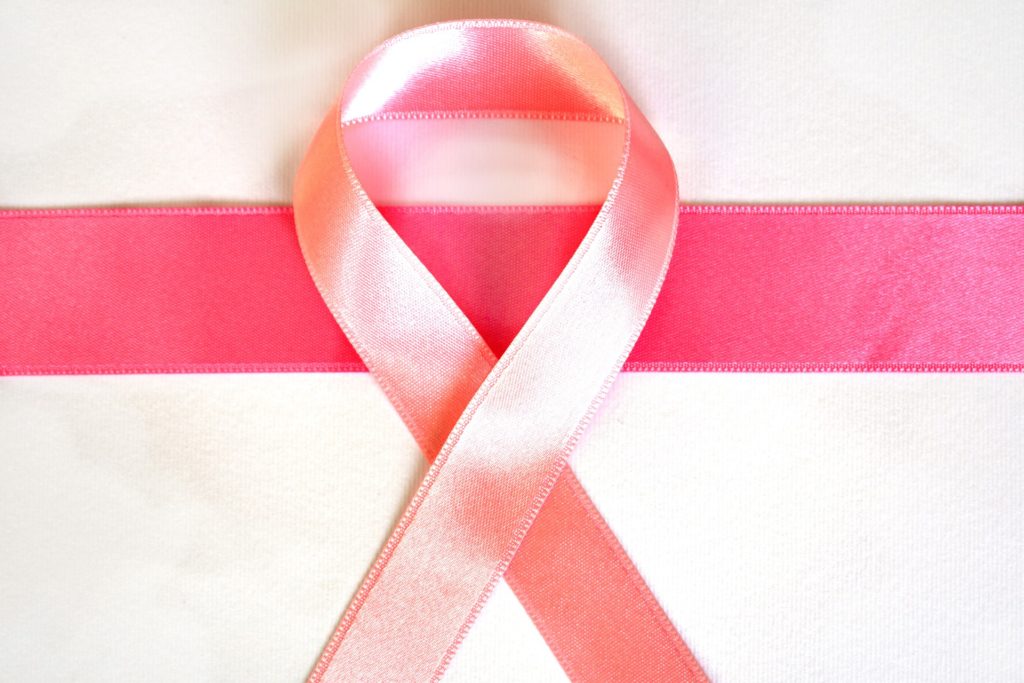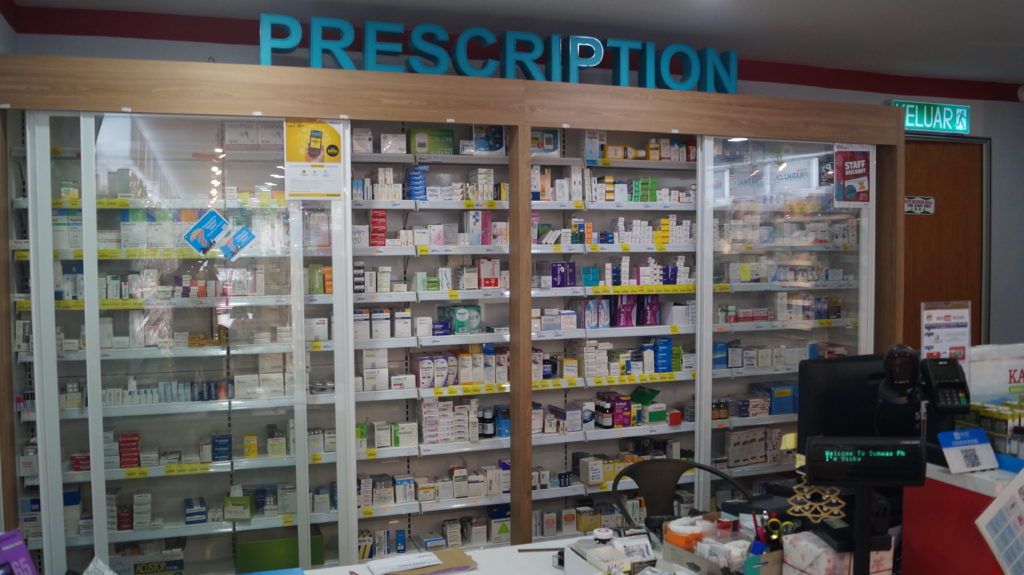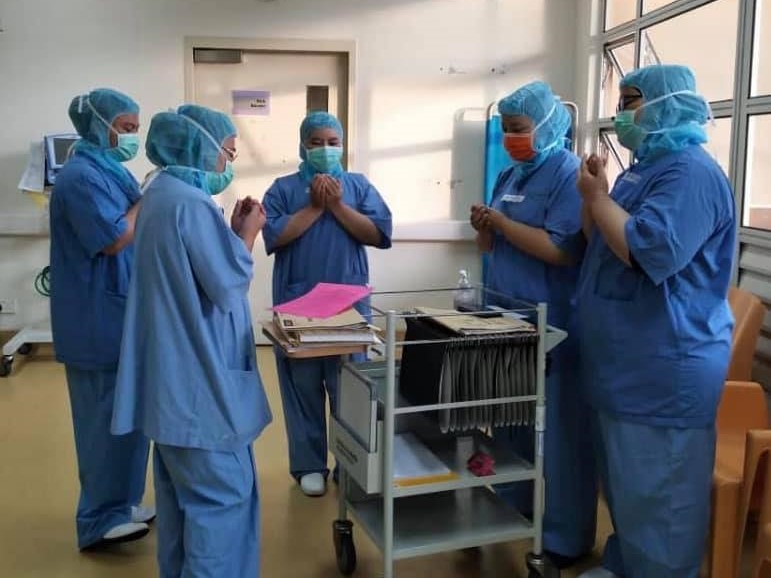KUALA LUMPUR, March 27 — As government doctors struggle to manage Malaysia’s growing coronavirus outbreak, a frontliner expresses worries about insufficient testing and patients who aren’t fully honest about their history.
A doctor from a government hospital in Johor highlighted the long-term impact of the Covid-19 outbreak on other patients, particularly people with cancer whose disease and survival rate may worsen as their surgeries get postponed, resulting in a backlog of cases.
CodeBlue interviewed two government doctors and a pharmacist, who talked about their experiences during the global Covid-19 pandemic that has killed 23 Malaysians, resulted in over 2,000 infections in Malaysia, and seen a total lockdown on two areas in Kluang, Johor. Yesterday saw the highest-ever daily spike in coronavirus cases at 235.
These are their stories:
Lack Of Testing For Asymptomatic Health Care Workers
Dr Blake* (not his real name), a 26-year-old houseman who does coronavirus screening at a public hospital in Kuala Lumpur, said he was not tested for Covid-19, even though he was in contact with a patient-under-investigation, because he did not display symptoms.
“Staff and the public currently are being treated equally (even when there are counters for staff). But we are more exposed to the virus. We might not show symptoms. But we could be a carrier.
“So I just want the Covid team to be more vigilant and do the test, especially on the staff if necessary and not wait until the symptoms show,” Dr Blake told CodeBlue Wednesday.
He pointed out that a staff from his hospital recently tested positive for Covid-19 with just fever and anosmia, the loss of the sense of smell. Common coronavirus symptoms, according to the World Health Organization (WHO), are fever, tiredness, and dry cough, while other symptoms are shortness of breath, aches and pains, and sore throat. About 80 per cent of the infected, according to a WHO report, have mild to moderate symptoms.
“The disease has no specific symptoms, so I think hospital staff should be prioritised and not neglected. If hospital staff are indeed in jeopardy, who will take care of the patients?”
Dr Blake*, anonymous houseman
STAT reported anecdotal evidence from clinicians in the United States and globally about how some Covid-19 patients experience anosmia. The American Academy of Otolaryngology reportedly wanted anosmia to be added to a list of Covid-19 screening tools, while WHO officials said Monday it would investigate a possible connection between coronavirus and anosmia, but cautioned that such evidence remained preliminary.
Health authorities announced yesterday that 80 Ministry of Health (MOH) health care workers have tested positive for Covid-19, with most cases from Teluk Intan Hospital, Perak. But authorities said none of them had been infected from handling coronavirus patients.
Dr Blake urged Malaysia to follow Italy’s footsteps by fast-tracking final year medical students to turn them into housemen, while housemen who have done one year’s work be fast-tracked to medical officers.
“This way, it will make management much smoother as a houseman can only do limited things due to medicolegal issues. MOs (medical officers) are working beyond 36-hour shifts with the on-call system. In times of crisis, we must do things out of the norm.”
The trainee doctor also complained that the Malaysian public did not realise the seriousness of the coronavirus pandemic.
“When we ask them for travel history or symptoms, many try to mask their answers or some deny any contacts, but indeed went for the tabligh gathering,” he said, referring to the Muslim religious event at Sri Petaling mosque here that accounted for over half of some 2,000 Covid-19 cases in the country.
“They are not only endangering the lives of themselves, but to doctors, nurses, PPK (senior health care assistants), and other patients if we put them in a crowded ward.”
When hospital staff prohibit men from joining their wife’s pregnancy scan appointments to minimise contact, the husbands get angry and demand to see their child’s heartbeat, said Dr Blake.
“When we do not allow visitors to enter, they say we are cruel, no humanity or sympathy towards them. When we take their temperature and ask them to stand one metre away, they ridicule and laugh at us. But we still do our duty the best we can,” he said.
“We do not want to be separated from our families as much as you do from yours. We do not want you to miss the first heartbeat of your baby. We just want our country safe and end this war so that you can have a healthy life with your loved ones for many years to come. Not in a coffin alone, being brought to the graveyard by people wearing personal protective equipment (PPE) and nobody is allowed to be there or give their last respects to you.”
Future Backlog Of Elective Surgeries, Possible Cancer Growth

Dr David* (not his real name), a medical officer at a public hospital in Johor, said MOH’s decision to postpone elective surgeries indefinitely would result in a backlog of cases once the Covid-19 outbreak is over. He spoke to CodeBlue on condition of anonymity for fear of government action against him.
Elective surgeries include operations for non-urgent cases like hernia, which one can wait for up to six months because there is no immediate danger. But, cancer cases could become an issue, Dr David said. As it is, the waiting period in government hospitals, even for tumour removal, is almost up to a month, which he said is already considered good.
“If I have cancer, I want to get rid of it as soon as possible,” Dr David told CodeBlue.
“But before that, I will also need to get pre-operation assessment — all these procedures will take a bit of time. Now with the postponement of that, I don’t know how my cancer cells will spread.”
He said with one month’s delay, cancer cells may not spread significantly. But if cancer surgeries are postponed for two to three months, a Stage 2 cancer may develop into Stage 3, and Stage 3 into Stage 4, with each stage associated with poorer prognosis.
According to the latest cancer registry report, cancer deaths in Malaysia rose by nearly 30 per cent. Malaysia also reported an increase of about five percentage points in cancers detected in the late stages to 63.7 per cent of cases in the 2012 to 2016 period, from 2007 to 2011.
“Let’s say if someone has a tumour that looks like something that I can operate on and remove, but in one month’s time, it may not be. It may invade the surroundings, where you cannot operate anymore. So in that sense, prognosis and outcome is totally different,” Dr David said.
According to Dr David, the government hospital he works at has perhaps nine to 10 tumour resection operations a week. So, a rough estimate could see 30 to 40 surgeries postponed in a month.
He also said he and his colleagues, none of whom are Covid-19 frontliners, have been working alternate days in a shift system, but when they’re on duty, they cover two persons’ work as the number of staff working has been halved. He believed this was done to reduce coronavirus infection risk that would result in 14 days’ quarantine and leave even fewer doctors available.
“In my opinion, I think what China did was something quite admirable to health care in the world, where they build hospitals really fast,” Dr David said, referring to China’s construction of two new hospitals in Wuhan, where Covid-19 originated from, in less than two weeks.
“The new hospital has just pure Covid cases. At the same time, it has less impact on the existing health care system and existing facilities.”
In Malaysia on the other hand, Dr David said a couple of public hospitals in Johor, as well as wards in some government hospitals, have been closed to deal specifically with Covid-19 cases and transferred non-coronavirus patients to other hospitals.
“When you close down wards for Covid cases, that also means that those who are rightfully supposed to be in those wards are not getting it.”
Dr David*, anonymous medical officer at a government hospital in Johor
Dr David also pointed out that the postponement of blood donations would affect dengue, haematology, and leukaemia patients, highlighting a “panicky” WhatsApp message from blood bank staff that said a blood donation campaign in Johor Baru, scheduled from March 18 to 31 before it was cancelled, had expected to receive 1,500 blood bags. Between 40 and 50 blood bags are used every day on average.
He urged the government to build new hospitals, even if they are temporary, so that existing facilities are less compromised in regular follow-ups.
“Some patients are not getting their rightful treatment.”
Understaffed Pharmacy, Patients Take Free Medicines For Granted

A contract MOH pharmacist at a government health clinic (Klinik Kesihatan) in Kuala Lumpur said the patient load at the clinic’s pharmacy increased substantially one week before the Movement Control Order (MCO) was announced on March 16; the national partial lockdown has now been extended to April 14. The number of patients with acute respiratory conditions, fever, cough, and cold also increased.
During the first week of the MCO, the clinic started limiting patient numbers to prevent crowding, resulting in many patients’ appointments getting rescheduled to next month. These patients had to get extra medications to last till their new appointment dates.
“The number of prescriptions we had to transcribe, fill, and dispense was up to almost 600 per day. Our pharmacy also received never-ending calls from patients to ask if we are open during the MCO period and whether they can collect their medications although the date of collection is still far ahead. We were understaffed, but we were working as hard as we could,” the pharmacist told CodeBlue last Friday, declining to be named.
The main health clinic suffered a shortage of pharmacists as some were required to work in community clinics (formerly known as Klinik 1Malaysia). Clinic staff had to ration face masks and hand sanitisers.
“Patients were asking for masks from us when we were dispensing medications, but we had to explain to them that the stocks are limited and are meant for MOH personnel only.
“Most patients do not understand the purpose of MCO, and requested for more medications in fear that they will not be able to come to the pharmacy to collect their medications in the following weeks or month,” said the pharmacist.
“Many patients take for granted of medications that are provided for free and, more often than not, feel entitled to get the quantity they want or to be given free masks.”
Anonymous MOH pharmacist at a Klinik Kesihatan in Kuala Lumpur
The pharmacist said patients were given two-month supplies of medicines to avoid coming for refills every month, even though this may burden pharmacy logistics and incur higher procurement costs.
A designated area for acute respiratory conditions was set up at their clinic, where a doctor will attend to patients with fever, cough, or cold. Once the consultation is complete, medications will be dispensed immediately by a pharmacist stationed at that area to minimise the number of patients coming to and crowding at the pharmacy.
The pharmacist expressed uncertainty as to whether Malaysia’s public health care system could cope with the Covid-19 outbreak, noting that health care has not received sufficient funding in the country. MOH’s RM31 billion budget for 2020 did not reach 4 per cent of Malaysia’s gross domestic product (GDP).
“Many of our hospitals and health clinics are not well equipped and run down, burdened with high patient load, and pharmacy departments operating with basic medications,” said the pharmacist.
The pharmacist said the global coronavirus pandemic also illustrated the need for funding of public health and biomedical research, but pointed out that Malaysia’s budget for research was reduced year after year.
Hiring contract doctors, nurses, and pharmacists during the coronavirus outbreak isn’t a viable solution either, said the pharmacist, who urged the government to offer more permanent posts or open up posts for contract pharmacists to join research institutes as research pharmacists.
“The pandemic affects health care workers in many ways, not only patients or the public at large,” said the pharmacist.
“Many people have asked why I continue to do so much or continue to serve in MOH when I am just a contract pharmacist. In times like these, I hope to contribute as much as I can for patients and for MOH, although my contract will end next year, and I am left with uncertainties about my future.”
Update at 10.30am:
Editor’s note: CodeBlue has removed the story of a doctor’s account at a public university hospital in Kuala Lumpur on her request, because she feared repercussions for her job. The hospital had spoken to CodeBlue and denied the doctor’s allegations, but CodeBlue is removing the doctor’s entire story after she retracted her account. The headline and the lede have also been amended to remove any mentions of the doctor’s account.








